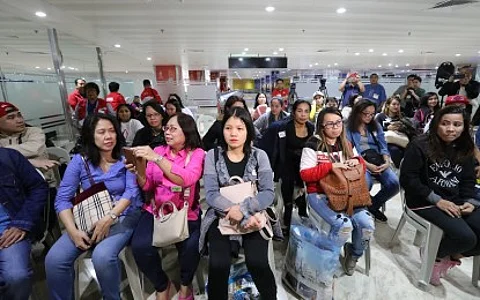
- NEWS
- the EDIT
- COMMENTARY
- BUSINESS
- LIFE
- SHOW
- ACTION
- GLOBAL GOALS
- SNAPS
- DYARYO TIRADA
- MORE

Overseas Filipino workers (OFWs) may now apply for socialized housing units under the government’s Expanded Pambansang Pabahay para sa Pilipino (4PH) program regardless of their monthly income. This development is part of a broader effort by the administration to make homeownership more inclusive while recognizing the significant role OFWs play in the national economy.
The Department of Human Settlements and Urban Development (DHSUD) said the Pag-IBIG Fund has expanded the eligibility criteria for OFWs under the 4PH initiative. Under the policy, OFWs may now apply for socialized housing regardless of their income classification, provided they meet other basic requirements, including being a first-time homeowner, an active Pag-IBIG member, and are under the age limit set for housing loan maturity.
DHSUD Secretary Jose Ramon Aliling said the reform reflects President Ferdinand Marcos Jr.’s directive to extend the reach of the government’s flagship housing program and make it accessible to more Filipinos, especially those working overseas. He described the move as a way of giving back to OFWs, whom he called modern-day heroes for their sacrifices and contributions to the economy.
“This is a small way to honor the difficult reality OFWs face living away from their families while continuously supporting the economy,” Aliling said in Filipino.
The new provisions are outlined in Pag-IBIG Fund Circular No. 473 signed by Chief Executive Officer Marilene Acosta on 10 July. Under the document, OFWs will be eligible to participate in the program regardless of their income, as long as they comply with all other requirements.
According to the Philippine Statistics Authority, as of 2023 over 2.16 million Filipinos were deployed overseas. With this change, a significant portion of that population could benefit from long-term housing security upon returning to the Philippines.
For non-OFW applicants, the original criteria remain in place. First-time homebuyers whose households fall within income deciles 1 to 7 may avail of the program. This covers families earning up to P47,000 per month in Metro Manila and up to P34,684 in other regions.
Another key provision of the expanded program is the reduced interest rate of only 3 percent per annum, fixed for up to 10 years. This marks a significant drop from the current market rate of 6.25 percent, effectively lowering the monthly amortization for socialized housing units.
For example, a horizontal unit priced at P850,000 would cost a beneficiary around P3,583 per month, compared to P5,233 under the regular rate. A vertical unit worth P1.5 million would require monthly payments of P6,324 instead of P9,235. Qualified applicants may receive additional government subsidies that could further lower these costs.
Aliling said the reforms are part of a broader effort to make housing not just accessible but truly affordable for working-class Filipinos. He pointed out the DHSUD continues to develop mechanisms to ease the financial burden of home acquisition and is working closely with partner agencies to ensure the successful implementation of the program.
“In the weeks ahead, we will release additional guidelines to improve and expand the reach of the 4PH initiative,” Aliling said. “We are committed to ensuring that every hardworking Filipino has the opportunity to own a decent home.”
